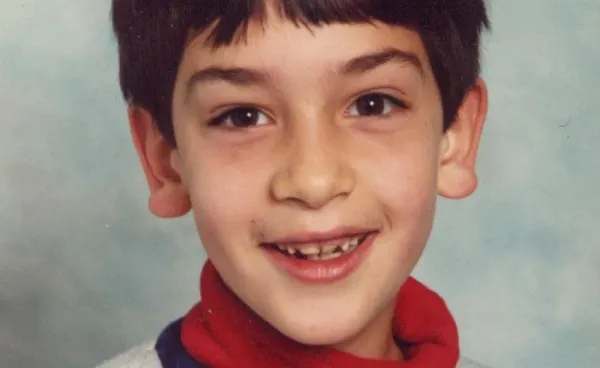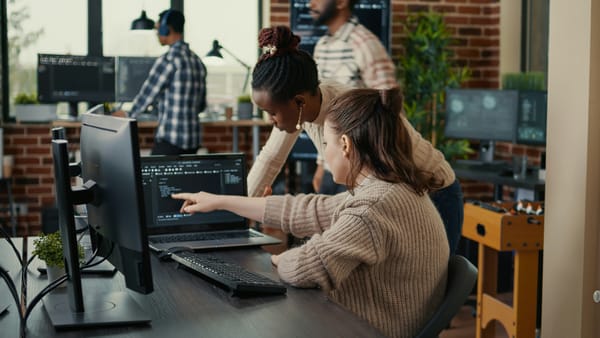A beautiful day on Colony 12
I can see twelve sailing dinghies out on the bay, tacking and jibing while the twin, hot suns reflect sparkles in the water. For a moment, I have to squint through the glare to see them from the bluff, but my lens corrects for the ambient light quickly. I save a vignette to my vault for posterity. Something to remember this view by.
“Sam!” I hear my mother call to me as if she was right here, but my lens lets me know she’s out on the water. The Aurora, her little blue sailboat, is in the middle of the group, and I can just about make out the shape of her waving to me from the stern. My lens catches me straining and shows me a picture-in-picture zoom of her face. “It’s such a beautiful day!”
At least I won’t have to waste any time looking for her.
“Mom, you need to come back to shore,” I say through our lens channel.
“Why? We’re having a competition out here,” she says. “I’m not winning yet, but I’m getting close!” She dips one hand in the water as her boat tilts with the wind. As spots of seawater spray onto her face, she grins broadly.
We can’t stay. While I stand on the bluff, my shoes dirtied by the marsh, escape pods are being readied.
I was three years old when we came to Colony 12. I dimly remember leaving the dark of the transport out to the sunny patch of dirt where terraforming was already underway. I grew up in the wooden home my parents built on the newly created bay. It’s where I learned to read; where my mother taught me to sail; where my father died from the lingering side effects of faster than light travel. It’s where I took care of my mother once it was just the two of us.
Colony 12’s twin planet follows in a Lagrange point sixty degrees behind its orbit. It was sunrise when it was struck by an asteroid; I was barely into my first cup of coffee. There was no flash. No roar or perceptible change. Just an unobtrusive notification from my lens telling me that the planets would collide within hours.
In less than that, the escape pods will leave. Not to the homeworld – that’s just a memory now – but to the constellation of motherships out beyond orbit. From there, perhaps we’ll join another colony, or find a new planet to inhabit.
It won’t be home.
I stand for a moment, taking in the smell of marsh and salt water I’ve known virtually for my whole life, and watch my mother’s smile. Just her and the wind.
But I have to tell her. I flick a news story about the collision to her lens.
“I’ll read that later, honey,” she says, her smile faltering a little. “I just want to sail right now.”
“We need to leave, Mom,” I tell her. “Right now. It’s dangerous to stay.”
“Nonsense,” Mom says. “It’s such a beautiful day. We’re having such a nice race. I wish you were out here with me, Sam.” In a way, I wish that too.
The Aurora is gaining on another, red sailing dinghy. Its wake cuts through the shimmering waves, returning my mother’s grin to full intensity.
I ask my lens to make sure there’s room reserved on the closest escape pod for both of us. Our places should have been allocated automatically, but I want to confirm. Everything is always taken care of – the lenses react to our conscious and subconscious intentions – but I can check if I want to. In the midst of all this subliminal technology, our waking lives on terraformed colonies aided by intelligent lenses plugged into to our central nervous systems, we’re still human beings.
One space is reserved.
I realize I recognize the pilot of the red dinghy: an old teacher of mine. His hair is lighter and the lines on his skin are more pronounced, but his face is unmistakable.
Glancing at the other sailors, I realize I recognize them all. In a single, terrible instant, I know why my mother won’t come in.
They’re all my mother’s age; all pioneer colonists. Early faster than light travel killed some of its test pilots outright. The others experienced symptoms that medical AI couldn’t diagnose. They all knew there was a risk, but they did it anyway. Our planet was dying. They needed to find a home for their children.
“I love you, Sammy,” my mother says, over the lens. She looks straight at me, eye to eye, over the link. I wish I could hold her hand one last time.
“I love you too, Mom,” I say.
“I’m proud of you,” she says.
“You’re everything I have,” I tell her. “I can’t leave without you.”
“I’ll be with you,” my mother tells me. “But you have to leave now.”
A new lens notification flashes into my peripheral vision. The twin is accelerating towards us. It’ll start interfering with our gravity within moments. We have under an hour left.
Something starts to pull at the treetops like an invisible hand.
“You need to go,” she says. “You don’t need me. Just picture me right now, out on the bay, with the wind in my sails. I'll be here.”
“Please,” I tell her.
“It’s a beautiful day,” my mother says, and the video link is cut.
I stand on the bluff, alone for the first time, watching the distant specks of boats float across the bay. This beautiful landscape, the smells, the mud on the bluff – it’s all her work. All for me.
I turn to leave. As I look back one last time, I think I can see the boats start to rise up from the water as the trees pull upwards. My mother’s face is turned with them, pointed at the sky.



